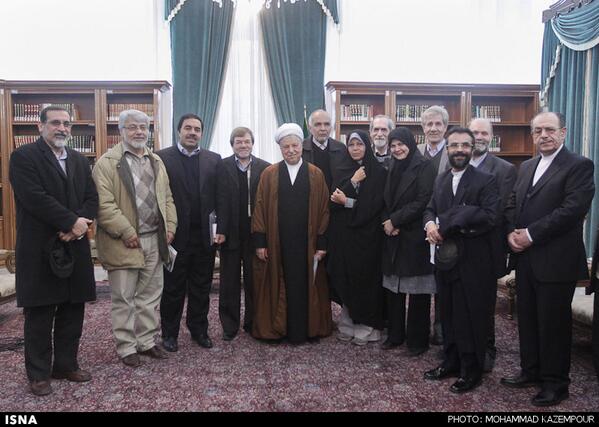LATEST: Photo: Rafsanjani Meets with Association of Press Freedom
Iran’s lead negotiator, Deputy Foreign Minister Abbas Araqchi, said on Sunday that Tehran and the 5+1 Powers (US, Britain, Germany, China, Russia, and France) have agreed implementation of the interim nuclear deal from January 20.
President Obama has welcomed the implementation of the agreement. Facing a move in the US Congress to impose new sanctions, he used the news to declare that tough US action had brought Iran’s agreement and to urge the legislators to refrain from the additional economic punishment.
Araqchi said the major issues in technical and then high-level political talks had been how to neutralize Iran’s stock of 20% enriched uranium and how Tehran would receive $4.2 billion in funds blocked under US-led sanctions. He said all sanctions on Iran’s automotive and petrochemical sectors and on transfer of gold and precious metals — used by countries like Turkey to pay for Iranian oil and natural gas — would be lifted from January 20.
US Secretary of State John Kerry had a different emphasis. Initially he declared:
Iran will voluntarily take immediate and important steps between now and January 20 to halt the progress of its nuclear program. Iran will also continue to take steps throughout the six months to live up to its commitments, such as rendering the entire stockpile of its 20% enriched uranium unusable for further enrichment. As this agreement takes effect, we will be extraordinarily vigilant in our verification and monitoring of Iran’s actions, an effort that will be led by the International Atomic Energy Agency.
Then Kerry made clear that Tehran would only get all of the $4.2 billion in assets at the end of the six-month deal.
The United States and the rest of our P5+1 partners will also take steps, in response to Iran fulfilling its commitments, to begin providing some limited and targeted relief. The $4.2 billion in restricted Iranian assets that Iran will gain access to as part of the agreement will be released in regular installments throughout the six months. The final installment will not be available to Iran until the very last day.
(Araqchi has now clarified that the $4.2 billion will be given to Iran in eight payments, as Iran converts half of its stock of 20% uranium into oxide, which has no potential for military use.)
And what of the prospects for a comprehensive deal with a year? Araqchi maintained caution:
#Iran's Araghchi: Talks on final step will be difficult w/ difficult issues. Reaching final agrmnt unclear. Final step will have time period
— Abas Aslani (@abasinfo) January 12, 2014
"Obama said the upcoming talks have a 50-50 % chance of success, I say its even less," Dep FM Araghchi tells state TV
— Thomas Erdbrink (@ThomasErdbrink) January 12, 2014
The start of the November deal was finally agreed on Thursday and Friday in talks between Araqchi, 5+1 Powers’ representative Catherine Ashton, and lead US negotiator Wendy Sherman. The arrangements were then referred to Tehran and the capitals of the 5+1 Powers for approval.
Photo: Rafsanjani Meets with Association of Press Freedom
Former President Hashemi Rafsanjani has met members of the Association of Press Freedom, including former political prisoners like Isa Saharkhiz:
Travel Ban Issued by Trial Court on Former Ahmadinejad Advisor Mortazavi
Saeed Mortazavi, former senior Presidential advisor and Tehran Prosecutor General, has been banned from travel by a trial court.
Mortazavi, his former deputy, and a former judge face charges of unlawful arrest, filing a false report, and assisting in the filing of a false report. The charges arise from the deaths of three protesters killed in the Kahrizak detention center after the disputed 2009 Presidential election.
Mortazavi has also been implicated by Parliament in a major embezzlement scandal during his leadership of the Social Security Fund in the Ahmadinejad Government.
Head of Atomic Energy Organization: “Advanced Centrifuges” Are Obstacle to Start of Nuclear Deal
Ali Akbar Salehi, the head of the Atomic Energy Organization of Iran, has confirmed that the issue of “advanced centrifuges” is the main obstacle to the start of an interim nuclear deal.
Salehi spoke on Saturday of last week’s high-level talks seeking to arrange the implementation of November’s agreement, which includes Iran’s suspension of enrichment of 20% uranium and an easing of US-led sanctions on Tehran:
“There were one or two issues for which the experts had gone to Geneva, and one of them which was raised by the other side was the advanced centrifuges.”
A year ago, Iran began introduction of the IR-2M centrifuge, replacing the 40-year-old IR-1, in the Natanz enrichment plant. However, it has only tested a few of the IR-2Ms, and none of them are operational.
The dispute holding up the implementation of the interim deal, which Iranian officials had hoped would begin January 20, is whether Iran can do anything with the IR-2Ms beyond “research and development”, such as installation. In addition, Western sources have claimed to journalists that Iran is testing a centrifuge which is even more advance.
Salehi expressed confidence that Iran and 5+1 Powers (US, Russia, China, Britain, France, Germany) would reach an agreement, with implementation from late January: “Our position is very good now; we carry out enrichment, and continue our discoveries and nuclear technology applications.”


